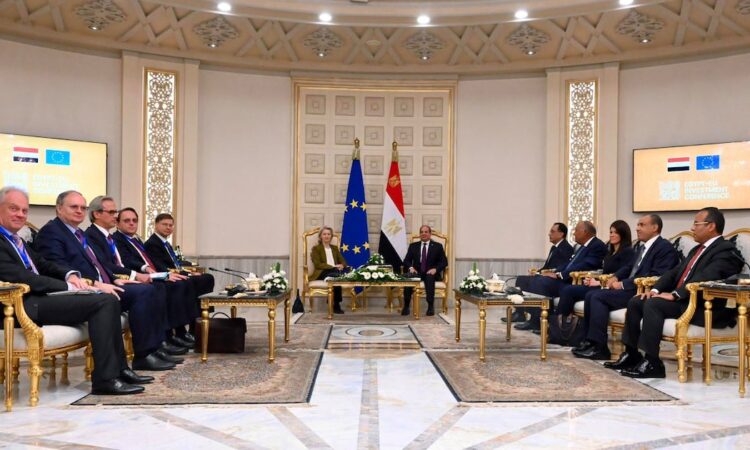
A high-level European Union delegation, led by EU Commission President Ursula von der Leyen, is in Egypt to take part in the EU-Egypt Investment Conference, which began on Saturday.
The two-day conference in the New Administrative Capital, east of Cairo, brings together more than 1,000 participants, including ministers, officials, European financial institutions and chief executives from various sectors from both the EU and Egypt.
The conference comes on the back of a landmark deal signed between the EU and Egypt in March, which includes up to €7.4 billion ($8 billion) in support for Cairo’s economic reform programme and business environment.
We have to strengthen the skills that Egyptians need to thrive in an economy of tomorrow
Ursula von der Leyen
In exchange, Egypt has agreed to assist the EU with several key issues, most notably the prevention of irregular immigration.
“This new agreement builds on profound ties between our people, and decades of co-operation between Egypt and the European Union,” said Ms von der Leyen during her opening statement on Saturday. “Europe is already Egypt’s largest trade partner and investor, accounting for 40 per cent of your foreign direct investments.”
During the conference, both sides are expected to sign an agreement for the first €1 billion package of macro-financial assistance.
Additionally, 20 memorandums of understanding (MoUs) worth €40 billion are set to be signed between Egypt and European companies, spanning sectors such as hydrogen, water management, construction, chemicals, shipping, aviation, and cars.
The Egyptian government will also use the conference to guide EU investors to the country’s most lucrative and viable sectors, said the country’s President Abdel Fattah El Sisi at Saturday’s opening.
The EU has pledged to invest in the development of Egypt’s workforce, with a €25 million project to be signed on Sunday to provide clean tech and digital training to young Egyptians.
“To achieve this, we also have to strengthen the skills that Egyptians need to thrive in an economy of tomorrow,” said Ms von der Leyen.
Egypt’s clean energy sector is expected to witness an upsurge in European capital, she said, adding that European companies will partner with Egyptian ones to domestically manufacture solar panels and wind turbines in order to cut the costs of importing them “from far away”.
In his opening remarks, Mr El Sisi said he hoped the conference would be “a new and fruitful step in the bilateral relations between us,” adding that the event was “a clear sign that Egypt is trusted by the EU”.
He also thanked Ms von der Leyen for her efforts in boosting EU-Egypt ties and her belief in Egypt’s role as a main strategic partner for the EU in the region.
Ms von der Leyen, in turn, emphasised the importance of Egypt’s stability and prosperity.
“Your stability and your prosperity are essential for an entire region,” she said. “As the European Union, we are making good on the commitments we made just three months ago. First, more financial assistance, more investment in strategic sectors, more skills for Egyptian workers.”
However, the leaders’ remarks notably omitted any mention of the issue of irregular migration, which is earmarked for €200 million of the deal’s total, and has drawn sharp criticism from human rights organisations.
Human Rights Watch has previously documented arbitrary arrests and mistreatment of migrants, asylum seekers and refugees by Egyptian authorities.
Criticism of Mr El Sisi’s regime is also mounting among the Egyptian population who have endured daily power cuts due to natural gas shortages. Their discontent has been made worse by successive heatwaves over the past month.
The fact that the government has repeatedly said it is prioritising natural gas exports to Europe to increase foreign currency above meeting local energy needs has only worsened the public’s perception of the EU.
The strengthening of ties also comes as many in the Arab world are viewing the EU increasingly negatively for its support of Israel during the war on Gaza, which has claimed the lives of nearly 38,000 Palestinians in the enclave.
However, the EU-Egypt Investment Conference represents a significant step forward in the strategic partnership between the two sides and provides much-needed financial assistance for Egypt’s economy, which is continuing to suffer from record high inflation as its people struggle to make ends meet.
Updated: June 29, 2024, 1:14 PM






